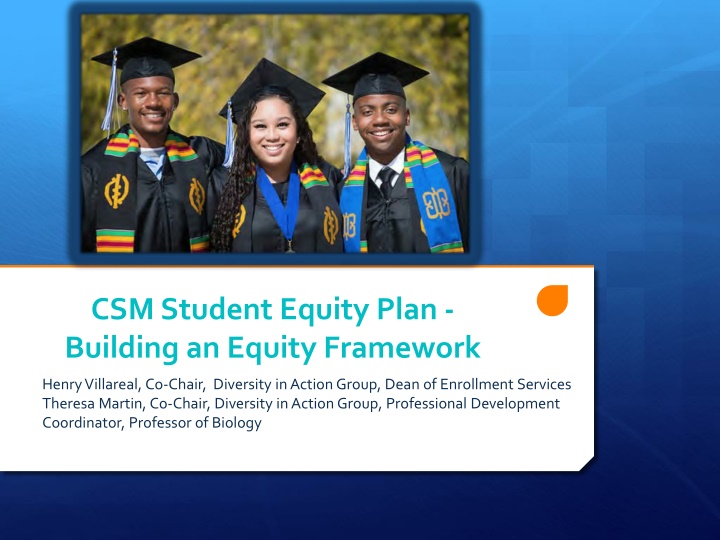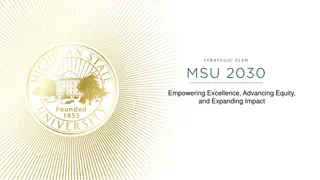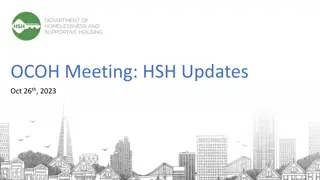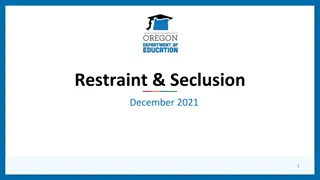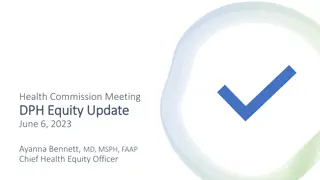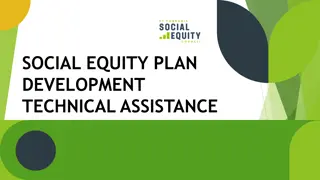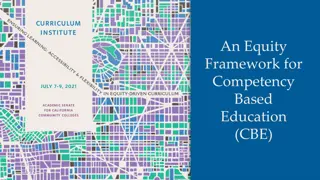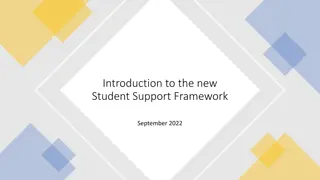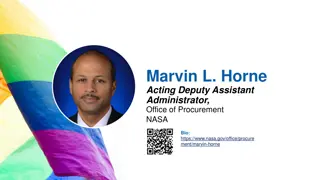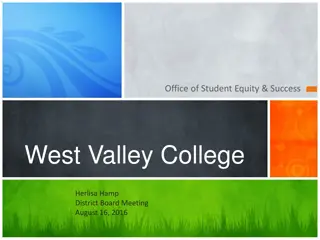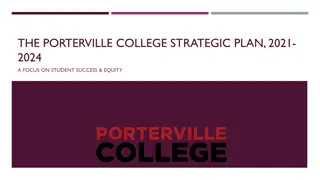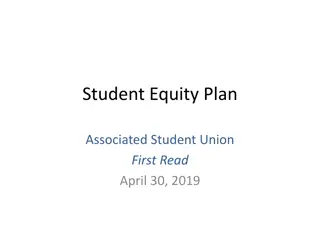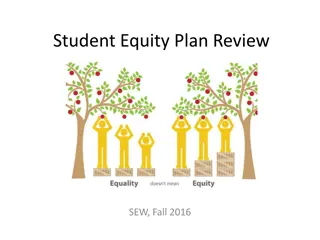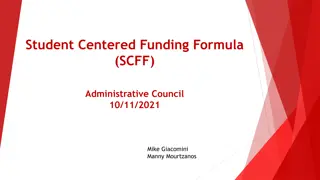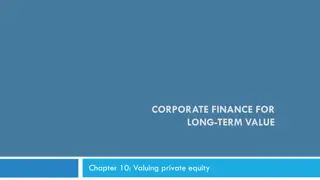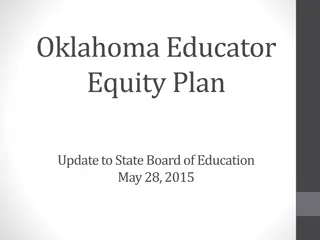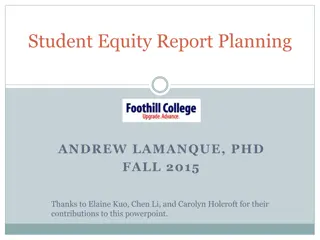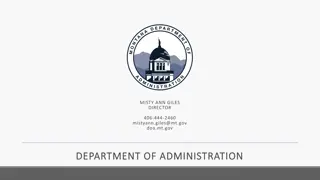Student Equity Plan: Building an Equity Framework
Student Equity Plan emphasizes the importance of equity in education for a better future, focusing on successful course completion rates and a commitment to equity. The plan outlines indicators and target populations to ensure access and completion for underserved groups, promoting diversity and inclusion in educational settings.
Download Presentation

Please find below an Image/Link to download the presentation.
The content on the website is provided AS IS for your information and personal use only. It may not be sold, licensed, or shared on other websites without obtaining consent from the author.If you encounter any issues during the download, it is possible that the publisher has removed the file from their server.
You are allowed to download the files provided on this website for personal or commercial use, subject to the condition that they are used lawfully. All files are the property of their respective owners.
The content on the website is provided AS IS for your information and personal use only. It may not be sold, licensed, or shared on other websites without obtaining consent from the author.
E N D
Presentation Transcript
CSM Student Equity Plan - Building an Equity Framework Henry Villareal, Co-Chair, Diversity in Action Group, Dean of Enrollment Services Theresa Martin, Co-Chair, Diversity in Action Group, Professional Development Coordinator, Professor of Biology
Why Student Equity? From the Academic Senate s 1992-93 Guidelines for Developing a Student Equity Plan ... It matters to our future and to our students California will not be a pleasant place to live for any of us if a permanent underclass largely composed of those from ethnic minorities has little stake in society and little hope for the future. We can now easily see how economically weak and socially explosive such a society would be. If community colleges work successfully in the effort to increase rates of student success, the State just might have a better future. If we fail, it is hard to imagine who else can make up for our failure.
Successful Course Completion Rates Source: Diversity in Action Group Assessment of Student Achievement/Equity Gap, March 2013
Student Equity Plan Success Indicators Access Course Completion ESL and Basic Skills Completion Degree and Certificate Completion Transfer
Student Equity Plan: CSM Target Populations Success Indicator Underserved Populations at CSM *Access Asian, Veterans, Hispanic or Latino Course Completion (Retention) Foster Youth, Black or African American, Native Hawaiian or Other Pacific Islander, Hispanic or Latino ESL and Basic Skills Completion Veteran, Multi-race, White, Hispanic or Latino Degree and Certificate Completion Multi-race, Males, Native Hawaiian or Other Pacific Islander, Filipino, Foster Youth Transfer Hispanic or Latino, Filipino, Disabled, Black or African American *Determining impacted target populations includes the College s service area, but CSM s students extend beyond its immediate service area and county. College data highlight that, in 2014-15, more than 17% of students were from outside jurisdictions. Disaggregation by ethnicity of this group present significant numbers of historically underserved populations, including Asian, African American, Filipino, Hispanic or Latino, Multi-race, and Pacific Islanders. Outreach efforts to these populations will be conducted to include these groups. In addition to prescribed target populations, other groups identified as being underserved are incarcerated youth, LGBTQ+, and undocumented students.
Wheredotheinequitiesemerge onthepathtocompletion? Preliminary findings from one large California District Credential Seeking Course Taking Service Area Population Enroll at Community College Assess as College Ready Sufficient Academic Performance Obtain Completion Credential 0% - 5 % 50% - 55 % 15% - 20 % 20% - 25 % Not much inequity is observed through the lens of our traditional access measure. The biggest driver of inequity in outcomes emerges here We need to place some sustained attention on pathways and milestone completion Our traditional approaches just might be widening the gap.
Coordination: CSM Instruction and Student (Support) Services Support Services Counseling Learning Center Financial Aid Psychological Services VROC International Student Center Learning Support Center Transfer Center EOPS Multicultural Center Health Services Food Pantry Instruction and Student Services Learning Communities Supplemental Instruction DSPS DIAG/Equity BSI Project Change Honors Program, etc. Academic and Social Integration of Students Learning Communities Field Trips The Village DIAG/Equity Guest Speakers Cultural Events Student Government Clubs, etc.
Student Equity Learning Communities Puente Focuses on the Latino experience Umoja Focuses on the African American Experience Mana Focuses on the Pacific Islander Experience Writing in The End Zone Focuses on Student Athletes Project Change Focuses on Incarcerated Youth Students for Success Focuses on ENGL 838/848 students Honors Project
CSM progression beyond Basic Skills, Spring 2013 Fall 2013 45 40 40% 35 30 Latino Non-Puente 28% 25 CSM General Population 24% 25% 20 Puente 15 14% 10 12% 5 ENGL 838 to 110+ ENGL 100 to 110+ 0
CSMs Equity Plan Focus Focus on course completion & basic skills completion Augment existing exemplary programs Provide well-aligned and proactive student support services Provide professional development on culturally responsive practice Experiment with ways to improve student success Assess activities for impact and opportunities for improvement
Acknowledgments Diversity In Action Group/Equity Committee Sylvia Aguirre-Alberto, Counseling Patricia Brown, Student Tabitha Conaway, Learning Center Kristin Dempsey, CA Institute for Behavioral Health Solutions Lorena Gonzalez, Counseling Fauzi Hamadeh, Student Life and Leadership James Howard, Peninsula Vet Center Theresa Martin, Co-Chair, Biology Lee Miller, Political Science Kate Motoyama, Communication Fi Tovo, Mana Program Krystal Romero, Student Support Services Annie Theodos, Academic Support Learning Technologies Makiko Ueda, Psychological Services Henry Villareal, Co-Chair, Enrollment Services Marco Zavala, Student
Acknowledgments Community Colleges League of California CCCChancellors Office Veronica A. K. Neal, Ed.D. Director (Preferred Pronouns: She/Her/Hers), Office Of Equity, Social Justice, and Multicultural Education, De Anza College Gregory M Stoup, Vice President, The RP Group Board. Senior Dean, Contra Costa Community College District Puente Program Coordinators, Lorena Gonzalez and Jon Kitamura
